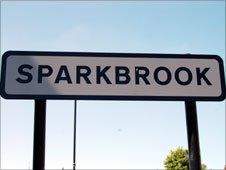'Terror cameras' row residents defend Sparkbrook
- Published

Nearly a third of the population of Sparkbrook is unempolyed
Before it found itself at the centre of the row over CCTV cameras, Sparkbrook was perhaps best known for being at the heart of the city's so-called "Balti triangle".
For much of the 20th Century the suburb was a heartland of Birmingham's Irish community.
In the past few decades post-war immigration has seen the Asian community rise to the point where it is now the bigger group.
Today, it accounts for 64% of the population, of which the largest group is Pakistani at 44%.
The area suffers from above average unemployment - the rate for men and women is 31%, compared to a city average of 20%.
Similarly, Washwood Heath has a population that is 65% of Asian origin, 56% of whom are of Pakistani origin, and has unemployment of about 30%.
Since 9/11 and the start of President Bush's "War on Terror" the areas have also experienced several terrorism-related arrests and raids on Islamic bookshops.
At a public meeting last week Jackie Russell, the director of the Safer Birmingham Partnership, said there had been 11 convictions for terrorist-related activity in Sparkbrook and Washwood Heath since 2007.
She also said the two areas' counter-terrorist profiles showed there are people living there with extremist links.
High-profile cases from the areas include Parviz Khan, the ringleader of a plot to capture and behead a serving British Muslim soldier, and Rashid Rauf, the alleged leader of Al Qaeda in the UK, who was later killed in Pakistan.
The very first Al Qaeda terrorist arrested in the UK was Moinul Abedin, from Sparkbrook, convicted of bombmaking and jailed for 20 years in 2002.
Yet locals say it is unfair to tar an entire suburb with the same brush.
They feel the row over the cameras just adds to the unfair negative perception many already have of the area.
"Why aren't these cameras being put up in places like Sutton Coldfield and Hall Green?," mused Maqsood Rahman, a former president of Sparkbrook Islamic Centre at the Jamia mosque.
"In our view, if it is to stop crime in general we are all for it. But to target a particular section of the community, this is wrong."
His friend Mohammed Afzal, the centre's manager, agreed: "It gives a negative impression.
"There are a lot of good things going on around here that don't get highlighted in the media."
- Published17 June 2010
- Published17 June 2010
- Published17 June 2010
- Published14 June 2010